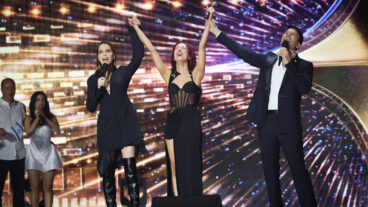“Master Peace” is a game that was designed with the goal of promoting creative communication and active listening.Working toward intercultural understanding and world peace may seem like serious business, but to Tamar Meshulam, it’s a game.
Not just any game, however, – a large, beautifully designed prize-winning game.
A unique project that Meshulam designed and built, entitled “Master Peace” won first place at the recent UNESCO Design contest in Japan, which has been held annually every five years in order to encourage young designers to develop creations that contribute to society and help to change the world for the better.
The contest, which carried a $10,000 prize, included more than 700 entrants from around the world, with a different theme each year. This year’s theme was interpersonal communication, with the title “Love/Why?”
She won the prize last month at the contest’s finals in Japan, which included 30 competitors, and is now a traveling exhibition. It is currently on display in Japan, Meshulam will demonstrate the game to American audiences for the first time at Felissimo House in New York, in an exhibit that is scheduled to run from September 6-28. The following month it will be displayed at UNESCO house in Paris.
She chose the form of a game, she says, “because the language of design can be quite elitist and a game is something that everyone can understand. I wanted to bring it down to earth and use what I know to make a real contribution. The game, of course, is a metaphor for real life and society.”
The game is made up of a round white felt board with ceramic pieces with different symbols on them. Meshulam guides the game sessions, which last for approximately two hours.
It is played by groups of up to nine people, preferably from different cultural backgrounds.
“I look for a multicultural groups, in which people are different, but not extremists in any way. This isn’t a conflict resolution game so I don’t look for extreme people and extreme situations. This is not a competitive game, but a cooperative game.”
So far, she has guided more than 30 groups in Israel, Great Britain, Holland and Belgium, with participants that included Jews and Arabs from various country, with the goal of “allowing people to meet each other beyond prejudices.”
The unique game she is “freethinking” and is designed with the goal of promoting creative communication and active listening. The game is not political, but emphasizes values that cross cultural and national barriers and help move forward dialogue that crosses those those barriers. There are no winners and losers.
As the players move their ceramic pebbles around the board, they pass through five stations, with the goal of reaching “Home.” As they travel, they are told to write the story of an imaginary journey that they take together, with every player contributing a sentence in the story. The goal of the exercise is to create a story that couldn’t be written by any single member of the group.
“The players create the story step by step, each one adding a fragment, each one with the opportunity to contribute their part, with each one dependent on one another and uncertain of how it will progress. It is set up so it’s impossible for one person to plan everything and the others to follow,” she explains.
Growing up in Jerusalem, Meshulam says, served as inspiration for this project. Throughout her life, she has watch people of different cultures live there side by side – sometimes in harmony, sometimes in conflict.
“It is very Israeli and Jerusalemite to get involved in trying to make things better. I wanted to do something that was positive and wasn’t cynical. This project was a way to support those who act for peace, and not try to fight extremists from either side but to strengthen and support the moderate center who represent my values.”
Meshulam, 34 graduated from the Bezalel School of Design in Jerusalem, focusing on industrial design, and worked in her field for several years, before leaving the country to pursue a master’s degree in Holland, which she completed in the spring. She had already developed the game in the framework of her studies when she learned of the UNESCO competition, “and I immediately knew that it was right for it.”
“When I created the game, I was trying to reflect in design what is happening in reality. I don’t think it is a coincidence that it suited this competition and won – because of the reality of the world today, the same ideas are popping up at the same time in different places.”
“It provides a learning experience of cooperation, through the collaborative challenge of creating something together,” Meshulam says. “It is meant for people who are interested in new ways of holding conversations and getting inspired by the personal qualities in their fellow players.”
Playing the game, she says is a challenge – but not in the traditional sense. Even though the game has no winners or losers, the whole group can lose if they don’t try hard enough and don’t listen to each other.
“I tried to promote the value of listening and sensitivity, to encourage improvisation. I believe in showing support for the values you stand for, and while it’s easy for extremists of all kind to stand up for themselves. That’s how society tends to get polarized and go to extremes. This was my way of representing the values of moderation and cooperation and sensitivity and giving it a shape and a form. Keeping a message of moderation and balance is crucial in a place like Jerusalem.”












